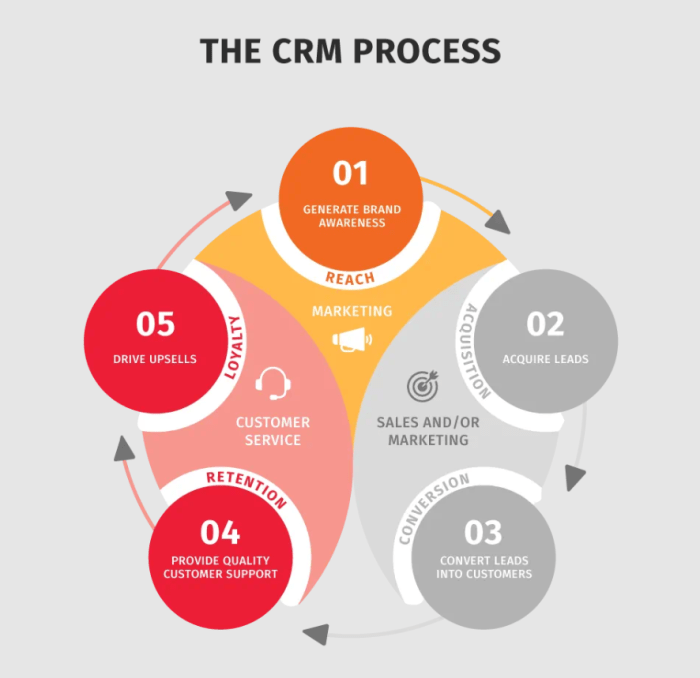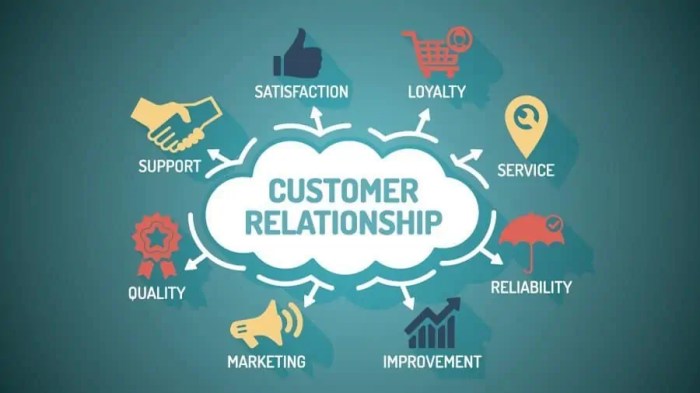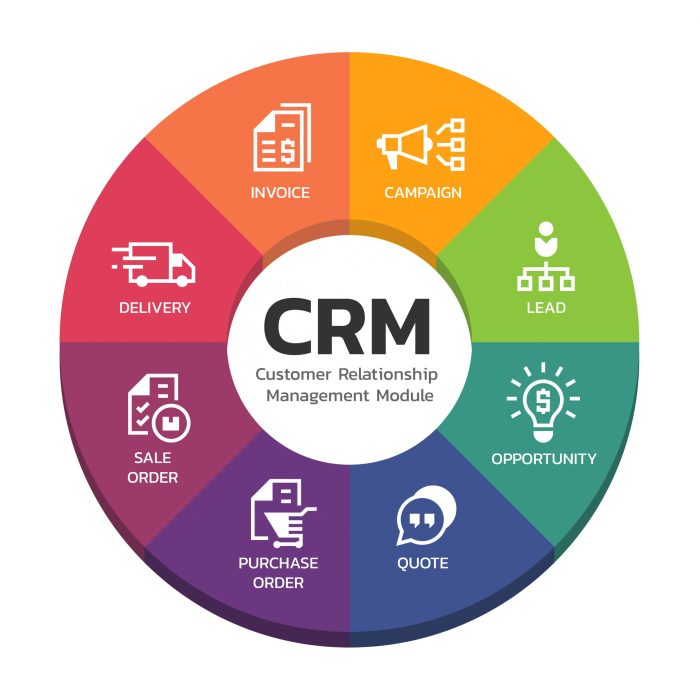What is CRM Marketing?
CRM marketing is a strategic approach that leverages customer relationship management (CRM) systems to enhance marketing efforts. It involves using data collected about customers to personalize interactions, optimize campaigns, and build stronger customer relationships.
The Relationship Between CRM and Marketing
CRM and marketing are intrinsically linked. CRM systems provide a centralized platform to manage customer data, interactions, and preferences. This data empowers marketers to understand customer behavior, segment audiences, and personalize messages. By integrating CRM data with marketing campaigns, businesses can target the right customers with the right message at the right time.
Benefits of Integrating CRM and Marketing Efforts
- Personalized Customer Experiences:CRM data allows for tailored communication based on individual customer preferences, leading to more relevant and engaging experiences.
- Improved Customer Retention:By understanding customer needs and preferences, businesses can provide proactive support, personalized offers, and targeted communication, fostering loyalty and reducing churn.
- Enhanced Campaign Effectiveness:CRM data enables marketers to optimize campaign targeting, messaging, and timing, leading to higher conversion rates and ROI.
- Data-Driven Decision Making:CRM analytics provide insights into customer behavior, campaign performance, and market trends, empowering businesses to make informed decisions.
Key Components of CRM Marketing
CRM marketing is built upon several core components that work together to drive successful strategies.
Customer Segmentation and Targeting
CRM systems enable businesses to segment customers based on demographics, behavior, purchase history, and other criteria. This allows for targeted marketing campaigns that resonate with specific customer groups, increasing engagement and conversion rates. For example, a clothing retailer could segment customers by age and style preferences to send personalized recommendations and promotions.
Data Management and Analytics
Effective CRM marketing relies on comprehensive data management and robust analytics. CRM systems capture and organize customer data, allowing for analysis to identify trends, patterns, and insights. This data-driven approach informs marketing decisions, campaign optimization, and customer segmentation.
Personalized Communication and Engagement
CRM data empowers businesses to personalize communication channels, such as email, SMS, social media, and website interactions. By tailoring messages to individual customer preferences, businesses can foster stronger relationships, increase engagement, and drive conversions. For instance, a travel agency could send personalized travel recommendations based on a customer’s past destinations and interests.
Marketing Automation and Workflows
Marketing automation tools integrated with CRM systems streamline repetitive tasks, such as email campaigns, lead nurturing, and social media updates. This allows marketers to focus on strategic initiatives while automating routine processes. For example, a CRM system can automatically send welcome emails to new customers or trigger follow-up messages based on specific customer actions.
Strategies for Effective CRM Marketing

Implementing CRM marketing effectively requires a strategic approach that leverages various channels and tactics.
Email Marketing Campaigns
Email marketing remains a powerful tool for CRM marketing. By segmenting email lists based on CRM data, businesses can send personalized messages, targeted offers, and relevant content. This approach increases open rates, click-through rates, and conversions. For instance, a bookstore could send personalized recommendations based on a customer’s past purchases or browsing history.
Social Media Marketing
CRM data can enhance social media marketing efforts. By analyzing customer interactions on social media, businesses can identify trends, understand customer sentiment, and tailor content to specific audience segments. CRM systems can also be used to automate social media posting and engagement, saving time and resources.
Content Marketing
Content marketing plays a crucial role in CRM marketing. By creating valuable and relevant content, businesses can attract and engage customers, build trust, and establish thought leadership. CRM data can inform content creation, ensuring that topics align with customer interests and preferences.
SMS Marketing
SMS marketing provides a direct and immediate communication channel for CRM campaigns. Businesses can use SMS to send targeted promotions, appointment reminders, or personalized messages. This approach offers high open and engagement rates, making it effective for time-sensitive campaigns.
Loyalty Programs
Loyalty programs are a key component of CRM marketing. By rewarding repeat customers, businesses can foster loyalty, increase engagement, and drive repeat purchases. CRM systems can be used to manage loyalty programs, track customer points, and personalize rewards.
Measuring CRM Marketing Success
Tracking and analyzing key metrics is essential for evaluating the effectiveness of CRM marketing campaigns.
Key Metrics for Evaluation
- Customer Acquisition Cost (CAC):Measures the cost of acquiring a new customer.
- Customer Lifetime Value (CLTV):Estimates the total revenue a customer will generate over their relationship with the business.
- Customer Churn Rate:Measures the percentage of customers who stop doing business with a company.
- Open Rates and Click-Through Rates (CTR):Track the engagement of email marketing campaigns.
- Social Media Engagement:Measures the number of likes, comments, shares, and other interactions on social media posts.
Tracking and Analyzing Metrics
CRM systems provide dashboards and reports to track and analyze key metrics. This data allows businesses to identify trends, optimize campaigns, and measure the impact of CRM marketing efforts. For example, businesses can track the performance of different customer segments, analyze the effectiveness of various marketing channels, and identify areas for improvement.
CRM Marketing Tools and Technologies
A wide range of CRM marketing platforms and tools are available to businesses of all sizes.
Popular CRM Marketing Platforms
- Salesforce:A comprehensive CRM platform with robust marketing automation features, analytics, and integration capabilities.
- HubSpot:A popular platform that combines CRM, marketing automation, sales, and service tools.
- Microsoft Dynamics 365:A cloud-based CRM platform with a focus on customer service and sales automation.
- Zoho CRM:A cost-effective CRM platform with a wide range of features, including marketing automation, analytics, and social media integration.
Choosing the Right CRM Solution
The best CRM solution for a business depends on its specific needs, budget, and industry. Consider factors such as the number of users, required features, integration capabilities, and scalability when making a selection.
Case Studies and Examples
Numerous companies have achieved significant success through effective CRM marketing strategies.
Example: Amazon

Amazon’s CRM strategy is built on personalized recommendations, targeted promotions, and customer segmentation. By leveraging customer data, Amazon delivers relevant product suggestions, personalized email campaigns, and tailored offers. This approach has resulted in increased customer engagement, repeat purchases, and a high CLTV.
Example: Netflix
Netflix utilizes CRM data to personalize content recommendations, optimize streaming algorithms, and personalize communication. By understanding customer viewing habits and preferences, Netflix delivers tailored content suggestions, reducing churn and increasing customer satisfaction.
Trends in CRM Marketing

The landscape of CRM marketing is constantly evolving, driven by emerging technologies and changing customer expectations.
Artificial Intelligence and Machine Learning
AI and ML are transforming CRM marketing by automating tasks, personalizing experiences, and providing predictive insights. AI-powered chatbots can provide instant customer support, while ML algorithms can analyze data to predict customer behavior and optimize campaign targeting.
Omnichannel Marketing
Omnichannel marketing is becoming increasingly important as customers interact with brands across multiple touchpoints. CRM systems play a crucial role in connecting these channels, providing a seamless and consistent customer experience.
Data Privacy and Security
Data privacy and security are paramount in CRM marketing. Businesses must comply with regulations such as GDPR and CCPA, ensuring that customer data is collected, stored, and used ethically and responsibly.